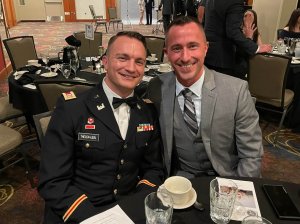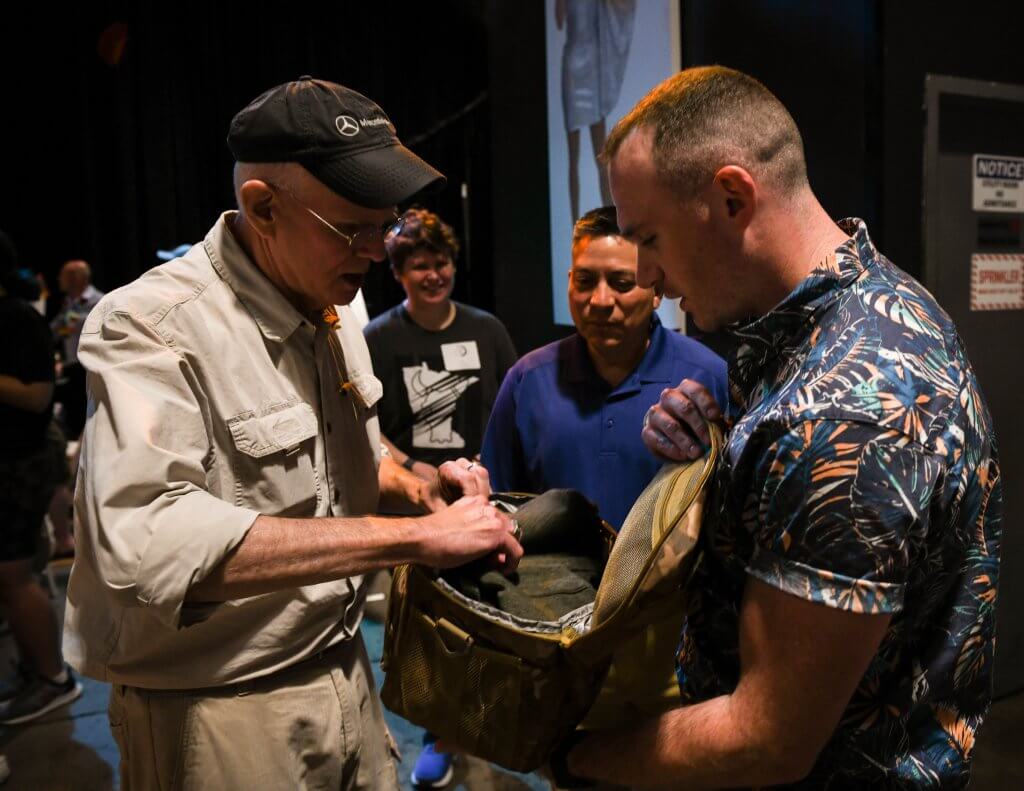Members of the Minnesota National Guard say efforts to recruit among the LGBTQ+ community, including with a campaign launched in 2020, have shown success.

The military does not keep data on the sexual orientation of its members, so precise numbers are not available. But based on anecdotal evidence, members of the MNG agree there’s been an increase in soldiers who openly identify as LGBTQ+ and are comfortable coming out.
“In the last couple years, I noticed a big, big change of people being open about it. It’s just part of life around here,” said Army Capt. Zack Thelen-Liebl, 33, who is bisexual and married to a man.
Army Capt. Forrest Jennings, 31, who is gay, agreed.
“Anecdotally, I certainly would say there are more people coming out,” said Jennings, who is an officer recruiter for the MNG and the advisor for the MNG’s LGBTQ Diversity and Inclusion Council, formed in 2015.
The MNG has eight councils, including:
- Native American;
- Holocaust Remembrance;
- Asian American and Pacific Islander;
- Women’s;
- African American;
- Latino and Hispanic; and
- Disability councils.
The LGBTQ Diversity and Inclusion Council focuses on “destigmatizing some of the preconceived notions about LBGTQ members and creating more inclusive spaces where people feel more open to be themselves,” Jennings said.
The MNG’s efforts to recruit among the LGBTQ+ community included a yearlong digital and print advertising beginning in spring 2020. That was planned by the MNG’s Retention Battalion Marketing and Advertising Department, Quartz reported.
There have been articles featuring LBGTQ+ members of the military, including Jennings and Thelen-Liebl, published in a Minnesota LBGTQ+ magazine, and an increase in events held by the LBGTQ council, like booths at Pride Month gatherings and speaking engagements in honor of National Coming Out Day.
Every fall, the council hosts a discussion panel for MNG members to ask questions “and create shared understanding and mutual respect,” Jennings said.
Things were very different when Thelen-Liebl and Jennings joined the military in 2006 and 2009, respectively, under the “Don’t Ask, Don’t Tell” policy. Implemented in 1993, the policy allowed gay, lesbian and bisexual soldiers to serve only if they kept their sexual orientation secret.
“I wanted to serve bad enough that I was resigned to being in the closet,” Jennings said. “But it’s extremely difficult to serve an organization, being willing to serve and die within that organization, and have it not allow you to be yourself.”
Thelen-Liebl said it wasn’t too difficult for him to keep his bisexuality hidden, also because he had a girlfriend at the time.
“There were several of my close friends and even friends in the unit who knew,” he said. “Nobody really cared, you just didn’t really talk about it, per se. I never experienced any animosity.”
Still, when DADT was repealed effective September 2011, it was a weight off his shoulders, said Thelen-Liebl, now battalion executive officer for the 682nd Engineer Battalion of the MNG.
“Especially when I was commissioned as an officer, I always hoped none of my soldiers would see me on date with a guy. After it was repealed, I didn’t have to worry as much,” Thelen-Liebl said.
Jennings said he waited a few years to come out — in his private life in 2013 and in the military in 2015, after he joined the Minnesota National Guard —because he first wanted to show he was a good soldier, he said.
Coming out can be a terrifying experience for soldiers, particularly those who are shunned by family and don’t want to lose their new military family, Jennings said. Ultimately, LGBTQ+ members simply want to be treated as everyone else and serve with dignity and respect, he said.
Being allowed to come out makes for better soldiers by taking one less worry away, and while there are differences in ideology and beliefs among soldiers, being backed by policy makes a huge difference, Thelen-Liebl said.
Minnesota was the first state to vote down in 2012 a constitutional amendment that would have banned same-sex marriage. Another pivotal year was 2015, when the U.S. Supreme Court ruled that states cannot keep same-sex couples from marrying and must recognize their unions.
Thelen-Liebl said that when he got his first command post in September 2017, he was open about being married to a man. At that time, he met a few people who were openly members of the LBGTQ community; when he got his second command post in October 2020 at brigade headquarters, that number became “significant.”
“Each year, it’s been more and more,” he said.
Campaigns such as the one launched in 2020 are effective in showing members of the LBGTQ+ community that the MNG values diversity, Jennings and Thelen-Liebl said.
“You can see the Minnesota National Guard is going out of their way,” Thelen-Liebl said. “You can see it on their Facebook page. And when it’s Pride Month, I’ve definitely noticed promoting and showing the inclusion within the formations.”
Still, more can be done, Jennings said.
For example, LGBTQ Diversity and Inclusion councils should be created for lower unit levels of the MNG, instead of only at the state headquarters, he said.
“It’s an initiative I have been working on, and it has support, but I know will take time,” Jennings said.

